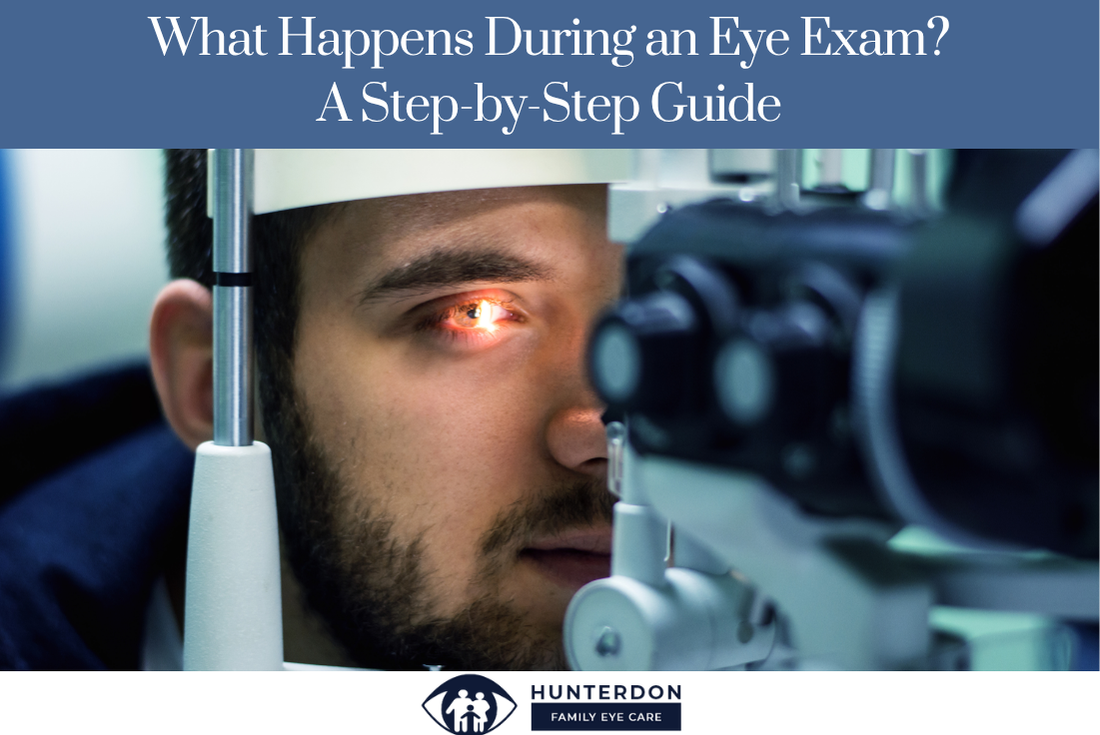If you’re due for an eye exam—or it’s your first one—you might be wondering what to expect. Whether you’re having trouble seeing clearly or simply want to protect your long-term vision, regular eye exams are an essential part of your health care routine.
At Hunterdon Family Eye Care, we make the process easy, informative, and comfortable. Here’s a detailed guide to what happens during a typical comprehensive eye exam.
👁️ Step-by-Step: What to Expect at Your Eye Exam
1. Initial Discussion & History
We start by learning about you. You’ll be asked about:
- Current vision concerns
- Medical and family history
- Any medications you’re taking
- Lifestyle and screen time habits
This helps us tailor the exam to your needs.
2. Visual Acuity Test
This is the “read the letters on the chart” portion. We check how clearly you can see at various distances and determine if you may need prescription glasses or contacts.
3. Refraction Testing
Using a device called a phoropter, we determine your exact lens prescription. You’ll be asked, “Which is better—1 or 2?” as we refine the lenses until your vision is at its best.
4. Eye Movement & Alignment Tests
We evaluate how well your eyes work together by testing muscle movement, depth perception, and coordination.
5. Slit Lamp Exam
This microscope allows us to examine the front of your eye (cornea, lens, iris) in detail, checking for signs of dry eye, infections, cataracts, and more.
6. Intraocular Pressure Test (Glaucoma Screening)
Using either a puff of air or a gentle probe, we measure the pressure inside your eye. This helps detect early signs of glaucoma.
7. Retinal Exam (Dilation)
In many cases, we use special drops to dilate your pupils, allowing us to look at the retina, optic nerve, and blood vessels in the back of the eye. This can reveal early signs of diabetes, macular degeneration, or retinal detachment.
❓ Q&A: Frequently Asked Questions
Q: Does an eye exam hurt?
A: Not at all. The tests are painless, although dilation may temporarily make your vision blurry and light-sensitive.
Q: How long does the exam take?
A: A full comprehensive exam typically takes about 30 to 45 minutes.
Q: Will I need to be dilated every time?
A: Not necessarily. Dilation depends on your risk factors, symptoms, and whether it’s your first visit or a follow-up.
Q: Can I drive after dilation?
A: Most people can drive safely afterward, but if you’re sensitive to light or unsure, bring a driver or wear sunglasses.
Q: How often should I have an eye exam?
A: Adults should have a routine eye exam every 1–2 years, or more frequently if you have diabetes, high blood pressure, or other risk factors.
Your Eyes Deserve Expert Care
Whether you’re a first-time patient or a long-time wearer of glasses or contacts, our team at Hunterdon Family Eye Care will make sure your exam is thorough and personalized. We’re here to answer your questions, explain your results, and help you see clearly for years to come.
📞 Call us today at (908) 730-6774
📍 Hunterdon Family Eye Care
Beaver Brook Concourse
1465 Route 31 South Ste. 22 Top Floor
Annandale, NJ 08801

